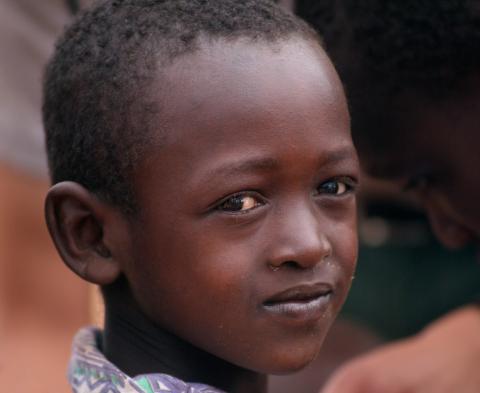
The saints I have met will never be canonized. They are just ordinary folk who live extraordinary lives in out of the way places. Maybe that is what “saintly” means. The only seals on their foreheads are the deep furrows brought by constant, persistent, worry about the well-being of others, usually their families and neighbors. Saints are the ones who risk it all without making a big deal about it.
I met one such out-of-the-way-saint in the fetid refugee camps of Ngara, Tanzania. He was a catechist from Burundi named Juvenalis Niboye. Juvenalis was a reluctant leader who had to stand up to a death threat. He had been chosen by the Christians in the camp of 20,000 Burundian refugees to lead their community because of his honesty and trustworthiness in the chaos that often prevailed around them. One day Juvenalis appeared at my house holding a letter that had been left at his door step. He was obviously very shaken by the contents of the letter. It contained a fearsome warning: either turn over the Sunday collection or be killed.
“I have two choices” he told me, “leave the camp and return to Burundi where I could be arrested, or stay here and take my chances with those who are threatening me.” A few days later I met him again and asked whether he had made a decision. “It is not easy because my wife wants us to return home, but I am afraid to go back to Burundi. So, I have decided to put my life in God’s hands and stay here.”
It takes nerve to be a saint! One needs a lot of courage when one risks it all, including the safety of one’s family. Fortunately, neither he nor his family was harmed; and after several more years in the “distress” of a refugee camp, the entire Burundian refugee community was able to return home.
Julius Nyerere, the former president of Tanzania, was one of these “servants” that we heard about in the first reading. When he was an old and retired, suffering from leukemia, he could have rested on his laurels and enjoyed a quiet life at home with his family. Instead, when asked to help mediate a peace process for the bloody ethnic conflict that had sent Juvenalis and his family into the refugee camps, he agreed. He knew it was extraordinarily difficult to reconcile the Tutsi and Hutu but he agreed to at least try. He firmly believed that “every nation, people and tongue” deserves a shot at peace.
Once, during the time when he was mediating the Burundian peace process, I had the opportunity to visit with him. I was asked to accompany our superior general on a visit to Nyerere’s home in rural Musoma. At his home village of Zanaki we were warmly greeted by his wife, Marie, who told us that one of Africa’s most famous statesmen was out hoeing his garden and would join us shortly.
During our visit over tea, I asked “Mwalimu” (which means teacher and was a widely used nickname for Nyerere) how things were going with the Burundi negotiations. His usual happy visage turned sad and he bowed his head in deep regret and said nothing for quite some time. “Not well at all,” he whispered, “but we will keep trying.”
Julius Nyerere is now called a “Servant of God” by the Catholic Church. He not only had great personal faith but also enormous social faith. He believed that all of us are God’s children, now, in this world, and therefore deserve to live in peace. Matthew tells us, “Blessed are the peacemakers for they shall be called children of God.” The peacemakers are the only ones in the list of Beatitudes who are mentioned twice. It is made clear that while they will be satisfied, they will also pay the price. As a servant of peace, Nyerere spent his final years and gave his last bit of energy to the reconciliation of Tutsi and Hutu in Burundi. He died of leukemia before a peace accord was reached but his tireless efforts were picked up and carried on by his friend, Nelson Mandela.
Jesus had great peripheral vision. He noticed those on the margins of society – those who keep trying despite insurmountable circumstances. He pointed out how their way of living was a benefit for others. You have to look at things in a different way to understand why the poor are “blessed.” Often he lifted up those who had suffered greatly for justice as models for us to follow if we want to discover the Kingdom. None were from the religious establishment of his time. Saints were often people on the margins. They were often nameless people like the widow who pestered an unjust judge until he gave in. They were unnamed people, like the leper who returned to express his gratitude for an unbelievable gift. Jesus seemed able to find the “blessed” ones all throughout society. He even saw how a life of sin could bring one eventually to seek God’s forgiveness as he told others “whenever the story was told of how his feet were washed, her name, not his, would be remembered.”
Ordinary saints are the grout that holds our fragile world together. They fill in the cracks in our broken lives. They hold together the bricks that make up society. Today it is our chance to honor these unnamed holy ones that have blessed our lives sometimes without our even being aware of their presence.
Photo of Tanzanian boy by Jim Stipe
